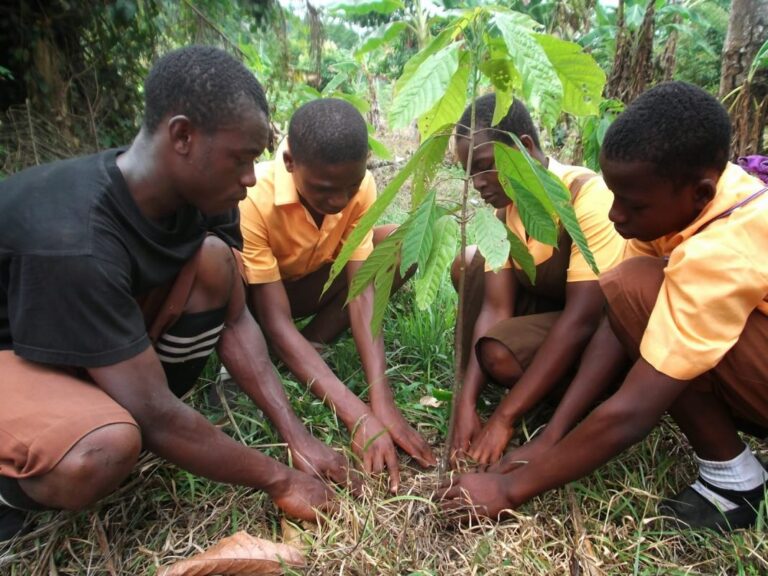Singapore and Ghana signed a carbon credit agreement on May 27, 2024, an important step towards global environmental sustainability. This deal allows companies in Singapore to offset part of their carbon tax by investing in certified carbon reduction projects in Ghana.
Unlocking the details of the Singapore-Ghana Carbon Credits Agreement
The Carbon Credit Agreement, officially known as the “Implementation agreement” promotes cooperation under Article 6 of the Paris Agreement. Grace Fu, Singapore’s Minister for Sustainability and Environment and Minister for Trade Relations, and Ghana’s Minister for Environment, Science, Technology and Innovation, Ophelia Hayford, were responsible for the signing.
The main features of this agreement are:
- Project developers must make a contribution 5% of revenue from authorized carbon credits to climate adaptation efforts in Ghana. It would help the country prepare for the consequences of climate change.
- Developers will have to do that cancel 2% of allowed carbon credits at the first issuance to further contribute to global emissions reduction. These carbon credits cannot be sold, traded or counted towards any country’s emissions targets. They will only contribute to a net decrease in global emissions.
- Under Singapore’s International Carbon Credit (ICC) Framework, eligible ICCs from this Implementation Agreement can be used by Singapore-based companies to offset up to 5% of their carbon tax obligations.
- The agreement may comply with binding mandates such as Nationally determined contributions (NDCs) and international mitigation requirements such as the Carbon Offset and Reduction Scheme for International Aviation (CORSIA).
This was said by Singaporean Minister Grace Fu.
“Singapore and Ghana share many mutual interests in the field of sustainability. The conclusion of the Implementation Agreement is a testament to our shared commitment to advancing global climate action through high-integrity carbon markets.”
She further assured that carbon credit projects under this agreement will deliver climate and economic benefits. Singapore will then continue to work with partners like Ghana to create opportunities for a sustainable future.
Promoting sustainable development in Ghana
According to media reports, the bilateral agreement follows Temasek-backed investment platform GenZero’s continued investments in a forest restoration project in Ghana’s Kwahu region.
The project, in collaboration with Singapore-based AJA Climate Solutions, aims to replant degraded forest reserves. It involves sustainably growing cocoa trees on shaded farms to protect them from climate impacts such as flooding, heat stress and pests.
The project area in the Kwahu region, once a lush forest 40 to 50 years ago, has been heavily exploited for timber in recent decades. This deforestation has caused Ghana to lose more hectares of cocoa every year, leading to economic ruin. Consequently, this Article 6 agreement and the project came as a boon to Ghana.
The forest project will ultimately focus on regenerating native tree species in degraded forests. It plans to grow 20 million seedlings within seven years to offset the impact of heavy deforestation.
Speaking of economic benefits, Ghana will experience more investment in its green projects.
These initiatives, which range from reforestation to renewable energy, will not only reduce carbon emissions, but also promote sustainable development and create employment in Ghana.
Supporting Singapore’s climate goals
For Singapore, this partnership is a strategic step to achieve its ambitious climate goals. The city-state has committed to reducing greenhouse gas emissions by 50% by 2030. The country wants to help companies by allowing them to offset their carbon taxes through foreign credits.
In particular, the Kwahu Project expands Singapore’s Article 6 intergovernmental partnerships. In November 2022, Singapore and Ghana concluded substantive negotiations on the Implementation Agreement on Cooperative Approaches. This agreement allows for the bilateral transfer of carbon credits, in accordance with Article 6.
Singapore will most likely witness the following impacts on its carbon credit economy:
- Carbon credits traded under this Implementation Agreement could offset a portion of Singapore companies’ carbon tax liabilities upon completion.
- This would be the first project in the country to generate carbon credits with corresponding adjustments under this Implementation Agreement.
We can conclude from this that the CO2 credit agreement offers a win-win scenario both economically and environmentally. Singapore companies will gain more flexibility in managing their carbon tax obligations, potentially reducing their operating costs. At the same time, Ghana is benefiting from the influx of money into its green economy, strengthening its efforts to combat climate change and boosting economic growth.
However, both countries need to establish a robust monitoring and verification mechanism to maintain the integrity of carbon credits.
Taken together, the Singapore-Ghana carbon credit agreement could leverage international cooperation to combat global climate change. No wonder it offers a scalable model for other countries to follow, paving the way for a more sustainable future.


